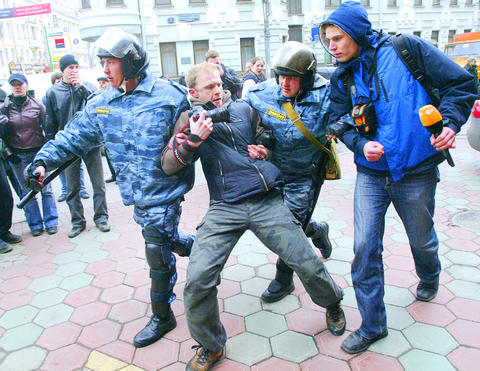Riot police clashed with opposition supporters yesterday at the end of an anti-Kremlin protest in Russia's second-largest city, chasing small groups of demonstrators, beating some on the ground and hauling them into police buses.
It was not immediately clear what sparked the violence after the rally, which city authorities had authorized and took place under a heavy police presence with at least one helicopter hovering above. No information was immediately available about how many people had been injured.
City authorities gave permission for the rally in a square on the edge of central St Petersburg, but banned plans for the demonstrators to march afterwards to the city's government headquarters.

PHOTO: AP
Police trucks and helmeted officers blocked the planned march route. At the end of the 90-minute rally, organizers did not call on protesters to march along the banned route, but suggested instead that they go on their own to the city government building over the next few days. When the rally dispersed, most participants went to a nearby subway station, where clashes broke out.
In one, police chased a group that included Sergei Gulyayev, a member of the city legislature who had been arrested at a protest last month. Police grabbed some members of the group and pounded them over the head with truncheons before putting them on buses. It was not immediately known if Gulyayev was among those taken away.
In another clash, police charged a group holding a banner professing love for the city.
The violence came a day after clashes at a similar opposition protest in Moscow, where police detained at least 170 people. The protests in both cities were called to focus on complaints that Russia under President Vladimir Putin is strangling democracy ahead of presidential and parliamentary elections.
"Yesterday, it became clear that the authorities won't be making any concessions. They have started a war on people," Eduard Limonov, head of the National Bolshevik Party, told yesterday's rally.
"Putin and his team are sitting on sacks of gold, at the same time the country is breaking apart in all spheres," said demonstrator Sergei Nilupov, a 56-year-old teacher.
One of the rally organizers, Olga Kurnosova, told reporters that police detained her near her home a few hours before the demonstration.
She said by telephone from a police station that she was held for distributing brochures about the rally, which she said was an artificial pretext because city authorities had given permission for the demonstration.
"It's clear that the reason was to keep me away from the demonstration," she said.
The weekend protests were part of a series of "Dissenters' Marches" called by the Other Russia umbrella group that brings together an array of opposition factions including one led by former world chess champion Garry Kasparov.
Kasparov was among those arrested in Moscow and was released late on Saturday night after being fined 1,000 rubles (US$38) for disrupting public order.
Kurnosova, who heads the St Petersburg branch of Kasparov's United Civil Front, said on Saturday that she expected the tough police action against protesters in Moscow to provoke a large turnout in St Petersburg.

PRECARIOUS RELATIONS: Commentators in Saudi Arabia accuse the UAE of growing too bold, backing forces at odds with Saudi interests in various conflicts A Saudi Arabian media campaign targeting the United Arab Emirates (UAE) has deepened the Gulf’s worst row in years, stoking fears of a damaging fall-out in the financial heart of the Middle East. Fiery accusations of rights abuses and betrayal have circulated for weeks in state-run and social media after a brief conflict in Yemen, where Saudi airstrikes quelled an offensive by UAE-backed separatists. The United Arab Emirates is “investing in chaos and supporting secessionists” from Libya to Yemen and the Horn of Africa, Saudi Arabia’s al-Ekhbariya TV charged in a report this week. Such invective has been unheard of

US President Donald Trump on Saturday warned Canada that if it concludes a trade deal with China, he would impose a 100 percent tariff on all goods coming over the border. Relations between the US and its northern neighbor have been rocky since Trump returned to the White House a year ago, with spats over trade and Canadian Prime Minister Mark Carney decrying a “rupture” in the US-led global order. During a visit to Beijing earlier this month, Carney hailed a “new strategic partnership” with China that resulted in a “preliminary, but landmark trade agreement” to reduce tariffs — but

SCAM CLAMPDOWN: About 130 South Korean scam suspects have been sent home since October last year, and 60 more are still waiting for repatriation Dozens of South Koreans allegedly involved in online scams in Cambodia were yesterday returned to South Korea to face investigations in what was the largest group repatriation of Korean criminal suspects from abroad. The 73 South Korean suspects allegedly scammed fellow Koreans out of 48.6 billion won (US$33 million), South Korea said. Upon arrival in South Korea’s Incheon International Airport aboard a chartered plane, the suspects — 65 men and eight women — were sent to police stations. Local TV footage showed the suspects, in handcuffs and wearing masks, being escorted by police officers and boarding buses. They were among about 260 South

Chinese President Xi Jinping’s (習近平) purge of his most senior general is driven by his effort to both secure “total control” of his military and root out corruption, US Ambassador to China David Perdue said told Bloomberg Television yesterday. The probe into Zhang Youxia (張又俠), Xi’s second-in-command, announced over the weekend, is a “major development,” Perdue said, citing the family connections the vice chair of China’s apex military commission has with Xi. Chinese authorities said Zhang was being investigated for suspected serious discipline and law violations, without disclosing further details. “I take him at his word that there’s a corruption effort under